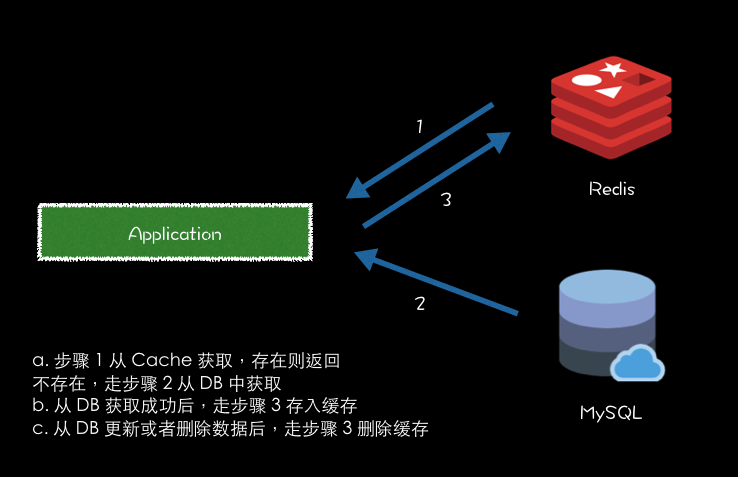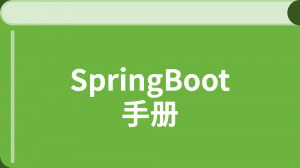阅读(4224)
赞(8)
Spring Boot 整合 Redis 实现缓存操作 | 泥瓦匠BYSocket
2017-06-03 18:14:38 更新
摘要: 原创出处 www.bysocket.com 「泥瓦匠BYSocket 」欢迎转载,保留摘要,谢谢!
『 产品没有价值,开发团队再优秀也无济于事 – 《启示录》 』
本文提纲
一、缓存的应用场景
二、更新缓存的策略
三、运行 springboot-mybatis-redis 工程案例
四、springboot-mybatis-redis 工程代码配置详解
运行环境:
Mac OS 10.12.x
JDK 8 +
Redis 3.2.8
Spring Boot 1.5.1.RELEASE
一、缓存的应用场景
什么是缓存?
在互联网场景下,尤其 2C 端大流量场景下,需要将一些经常展现和不会频繁变更的数据,存放在存取速率更快的地方。缓存就是一个存储器,在技术选型中,常用 Redis 作为缓存数据库。缓存主要是在获取资源方便性能优化的关键方面。
Redis 是一个高性能的 key-value 数据库。GitHub 地址:https://github.com/antirez/redis 。Github 是这么描述的:
Redis is an in-memory database that persists on disk. The data model is key-value, but many different kind of values are supported: Strings, Lists, Sets, Sorted Sets, Hashes, HyperLogLogs, Bitmaps.
缓存的应用场景有哪些呢?
比如常见的电商场景,根据商品 ID 获取商品信息时,店铺信息和商品详情信息就可以缓存在 Redis,直接从 Redis 获取。减少了去数据库查询的次数。但会出现新的问题,就是如何对缓存进行更新?这就是下面要讲的。
二、更新缓存的策略
参考《缓存更新的套路》http://coolshell.cn/articles/17416.html,缓存更新的模式有四种:Cache aside, Read through, Write through, Write behind caching。
这里我们使用的是 Cache Aside 策略,从三个维度:(摘自 耗子叔叔博客)
失效:应用程序先从cache取数据,没有得到,则从数据库中取数据,成功后,放到缓存中。
命中:应用程序从cache中取数据,取到后返回。
更新:先把数据存到数据库中,成功后,再让缓存失效。
大致流程如下:
获取商品详情举例
a. 从商品 Cache 中获取商品详情,如果存在,则返回获取 Cache 数据返回。
b. 如果不存在,则从商品 DB 中获取。获取成功后,将数据存到 Cache 中。则下次获取商品详情,就可以从 Cache 就可以得到商品详情数据。
c. 从商品 DB 中更新或者删除商品详情成功后,则从缓存中删除对应商品的详情缓存

三、运行 springboot-mybatis-redis 工程案例
git clone 下载工程 springboot-learning-example ,项目地址见 GitHub – https://github.com/JeffLi1993/springboot-learning-example。
下面开始运行工程步骤(Quick Start):
1.数据库和 Redis 准备
a.创建数据库 springbootdb:
CREATE DATABASE springbootdb;b.创建表 city :(因为我喜欢徒步)
DROP TABLE IF EXISTS `city`;
CREATE TABLE `city` (
`id` int(10) unsigned NOT NULL AUTO_INCREMENT COMMENT'城市编号',
`province_id` int(10) unsigned NOT NULL COMMENT'省份编号',
`city_name` varchar(25) DEFAULT NULL COMMENT'城市名称',
`description` varchar(25) DEFAULT NULL COMMENT'描述',
PRIMARY KEY (`id`)
) ENGINE=InnoDB AUTO_INCREMENT=1 DEFAULT CHARSET=utf8;c.插入数据
INSERT city VALUES (1 ,1,'温岭市','BYSocket 的家在温岭。');d.本地安装 Redis
详见写过的文章《 Redis 安装 》http://www.bysocket.com/?p=917
2. springboot-mybatis-redis 工程项目结构介绍
springboot-mybatis-redis 工程项目结构如下图所示:
org.spring.springboot.controller - Controller 层
org.spring.springboot.dao - 数据操作层 DAO
org.spring.springboot.domain - 实体类
org.spring.springboot.service - 业务逻辑层
Application - 应用启动类
application.properties - 应用配置文件,应用启动会自动读取配置3.改数据库配置
打开 application.properties 文件, 修改相应的数据源配置,比如数据源地址、账号、密码等。
(如果不是用 MySQL,自行添加连接驱动 pom,然后修改驱动名配置。)
4.编译工程
在项目根目录 springboot-learning-example,运行 maven 指令:
mvn cleaninstall5.运行工程
右键运行 springboot-mybatis-redis 工程 Application 应用启动类的 main 函数。
项目运行成功后,这是个 HTTP OVER JSON 服务项目。所以用 postman 工具可以如下操作
根据 ID,获取城市信息
GET http://127.0.0.1:8080/api/city/1
再请求一次,获取城市信息会发现数据获取的耗时快了很多。服务端 Console 输出的日志:
2017-04-13 18:29:00.273 INFO 13038 --- [nio-8080-exec-1] o.s.s.service.impl.CityServiceImpl : CityServiceImpl.findCityById() : 城市插入缓存 >> City{id=12, provinceId=3, cityName='三亚', description='水好,天蓝'}
2017-04-13 18:29:03.145 INFO 13038 --- [nio-8080-exec-2] o.s.s.service.impl.CityServiceImpl : CityServiceImpl.findCityById() : 从缓存中获取了城市 >> City{id=12, provinceId=3, cityName='三亚', description='水好,天蓝'}可见,第一次是从数据库 DB 获取数据,并插入缓存,第二次直接从缓存中取。
更新城市信息
PUT http://127.0.0.1:8080/api/city
删除城市信息
DELETE http://127.0.0.1:8080/api/city/2
这两种操作中,如果缓存有对应的数据,则删除缓存。服务端 Console 输出的日志:
2017-04-13 18:29:52.248 INFO 13038 --- [nio-8080-exec-9] o.s.s.service.impl.CityServiceImpl : CityServiceImpl.deleteCity() : 从缓存中删除城市 ID >> 12四、springboot-mybatis-redis 工程代码配置详解
这里,我强烈推荐 注解 的方式实现对象的缓存。但是这里为了更好说明缓存更新策略。下面讲讲工程代码的实现。
pom.xml 依赖配置:
<?xml version="1.0" encoding="UTF-8"?>
<project xmlns="http://maven.apache.org/POM/4.0.0" xmlns:xsi="http://www.w3.org/2001/XMLSchema-instance"
xsi:schemaLocation="http://maven.apache.org/POM/4.0.0 http://maven.apache.org/xsd/maven-4.0.0.xsd">
<modelVersion>4.0.0</modelVersion>
<groupId>springboot</groupId>
<artifactId>springboot-mybatis-redis</artifactId>
<version>0.0.1-SNAPSHOT</version>
<name>springboot-mybatis-redis :: 整合 Mybatis 并使用 Redis 作为缓存</name>
<!-- Spring Boot 启动父依赖 -->
<parent>
<groupId>org.springframework.boot</groupId>
<artifactId>spring-boot-starter-parent</artifactId>
<version>1.5.1.RELEASE</version>
</parent>
<properties>
<mybatis-spring-boot>1.2.0</mybatis-spring-boot>
<mysql-connector>5.1.39</mysql-connector>
<spring-boot-starter-redis-version>1.3.2.RELEASE</spring-boot-starter-redis-version>
</properties>
<dependencies>
<!-- Spring Boot Reids 依赖 -->
<dependency>
<groupId>org.springframework.boot</groupId>
<artifactId>spring-boot-starter-redis</artifactId>
<version>${spring-boot-starter-redis-version}</version>
</dependency>
<!-- Spring Boot Web 依赖 -->
<dependency>
<groupId>org.springframework.boot</groupId>
<artifactId>spring-boot-starter-web</artifactId>
</dependency>
<!-- Spring Boot Test 依赖 -->
<dependency>
<groupId>org.springframework.boot</groupId>
<artifactId>spring-boot-starter-test</artifactId>
<scope>test</scope>
</dependency>
<!-- Spring Boot Mybatis 依赖 -->
<dependency>
<groupId>org.mybatis.spring.boot</groupId>
<artifactId>mybatis-spring-boot-starter</artifactId>
<version>${mybatis-spring-boot}</version>
</dependency>
<!-- MySQL 连接驱动依赖 -->
<dependency>
<groupId>mysql</groupId>
<artifactId>mysql-connector-java</artifactId>
<version>${mysql-connector}</version>
</dependency>
<!-- Junit -->
<dependency>
<groupId>junit</groupId>
<artifactId>junit</artifactId>
<version>4.12</version>
</dependency>
</dependencies>
</project>包括了 Spring Boot Reids 依赖、 MySQL 依赖和 Mybatis 依赖。
在 application.properties 应用配置文件,增加 Redis 相关配置
## 数据源配置
spring.datasource.url=jdbc:mysql://localhost:3306/springbootdb?useUnicode=true&characterEncoding=utf8
spring.datasource.username=root
spring.datasource.password=123456
spring.datasource.driver-class-name=com.mysql.jdbc.Driver
## Mybatis 配置
mybatis.typeAliasesPackage=org.spring.springboot.domain
mybatis.mapperLocations=classpath:mapper/*.xml
## Redis 配置
## Redis数据库索引(默认为0)
spring.redis.database=0
## Redis服务器地址
spring.redis.host=127.0.0.1
## Redis服务器连接端口
spring.redis.port=6379
## Redis服务器连接密码(默认为空)
spring.redis.password=
## 连接池最大连接数(使用负值表示没有限制)
spring.redis.pool.max-active=8
## 连接池最大阻塞等待时间(使用负值表示没有限制)
spring.redis.pool.max-wait=-1
## 连接池中的最大空闲连接
spring.redis.pool.max-idle=8
## 连接池中的最小空闲连接
spring.redis.pool.min-idle=0
## 连接超时时间(毫秒)
spring.redis.timeout=0详细解释可以参考注释。对应的配置类:org.springframework.boot.autoconfigure.data.redis.RedisProperties
CityRestController 控制层依旧是 Restful 风格的,详情可以参考《Springboot 实现 Restful 服务,基于 HTTP / JSON 传输》。 http://www.bysocket.com/?p=1627 domain 对象 City 必须实现序列化,因为需要将对象序列化后存储到 Redis。如果没实现 Serializable ,控制台会爆出以下异常:
Serializable
java.lang.IllegalArgumentException: DefaultSerializer requires a Serializable payload but received an object oftypeCity.java 城市对象:
package org.spring.springboot.domain;
import java.io.Serializable;
/**
* 城市实体类
*
* Created by bysocket on 07/02/2017.
*/
public class City implements Serializable {
private static final long serialVersionUID = -1L;
/**
* 城市编号
*/
private Longid;
/**
* 省份编号
*/
private Long provinceId;
/**
* 城市名称
*/
private String cityName;
/**
* 描述
*/
private String description;
public Long getId() {
return id;
}
public void setId(Longid) {
this.id =id;
}
public Long getProvinceId() {
return provinceId;
}
public void setProvinceId(Long provinceId) {
this.provinceId = provinceId;
}
public String getCityName() {
return cityName;
}
public void setCityName(String cityName) {
this.cityName = cityName;
}
public String getDescription() {
return description;
}
public void setDescription(String description) {
this.description = description;
}
@Override
public String toString() {
return "City{" +
"id=" +id +
", provinceId=" + provinceId +
", cityName='" + cityName + '\'' +
", description='" + description + '\'' +
'}';
}
}如果需要自定义序列化实现,只要实现 RedisSerializer 接口去实现即可,然后在使用 RedisTemplate.setValueSerializer 方法去设置你实现的序列化实现。
主要还是城市业务逻辑实现类 CityServiceImpl.java:
package org.spring.springboot.service.impl;
import org.slf4j.Logger;
import org.slf4j.LoggerFactory;
import org.spring.springboot.dao.CityDao;
import org.spring.springboot.domain.City;
import org.spring.springboot.service.CityService;
import org.springframework.beans.factory.annotation.Autowired;
import org.springframework.data.redis.core.RedisTemplate;
import org.springframework.data.redis.core.StringRedisTemplate;
import org.springframework.data.redis.core.ValueOperations;
import org.springframework.stereotype.Service;
import java.util.List;
import java.util.concurrent.TimeUnit;
/**
* 城市业务逻辑实现类
* <p>
* Created by bysocket on 07/02/2017.
*/
@Service
public class CityServiceImpl implements CityService {
private static final Logger LOGGER = LoggerFactory.getLogger(CityServiceImpl.class);
@Autowired
private CityDao cityDao;
@Autowired
private RedisTemplate redisTemplate;
/**
* 获取城市逻辑:
* 如果缓存存在,从缓存中获取城市信息
* 如果缓存不存在,从 DB 中获取城市信息,然后插入缓存
*/
public City findCityById(Longid) {
// 从缓存中获取城市信息
String key ="city_" +id;
ValueOperations<String, City> operations = redisTemplate.opsForValue();
// 缓存存在
boolean hasKey = redisTemplate.hasKey(key);
if (hasKey) {
City city = operations.get(key);
LOGGER.info("CityServiceImpl.findCityById() : 从缓存中获取了城市 >> " + city.toString());
return city;
}
// 从 DB 中获取城市信息
City city = cityDao.findById(id);
// 插入缓存
operations.set(key, city, 10, TimeUnit.SECONDS);
LOGGER.info("CityServiceImpl.findCityById() : 城市插入缓存 >> " + city.toString());
return city;
}
@Override
public Long saveCity(City city) {
return cityDao.saveCity(city);
}
/**
* 更新城市逻辑:
* 如果缓存存在,删除
* 如果缓存不存在,不操作
*/
@Override
public Long updateCity(City city) {
Long ret = cityDao.updateCity(city);
// 缓存存在,删除缓存
String key ="city_" + city.getId();
boolean hasKey = redisTemplate.hasKey(key);
if (hasKey) {
redisTemplate.delete(key);
LOGGER.info("CityServiceImpl.updateCity() : 从缓存中删除城市 >> " + city.toString());
}
return ret;
}
@Override
public Long deleteCity(Longid) {
Long ret = cityDao.deleteCity(id);
// 缓存存在,删除缓存
String key ="city_" +id;
boolean hasKey = redisTemplate.hasKey(key);
if (hasKey) {
redisTemplate.delete(key);
LOGGER.info("CityServiceImpl.deleteCity() : 从缓存中删除城市 ID >> " +id);
}
return ret;
}
}首先这里注入了 RedisTemplate 对象。联想到 Spring 的 JdbcTemplate ,RedisTemplate 封装了 RedisConnection,具有连接管理,序列化和 Redis 操作等功能。还有针对 String 的支持对象 StringRedisTemplate。
Redis 操作视图接口类用的是 ValueOperations,对应的是 Redis String/Value 操作。还有其他的操作视图,ListOperations、SetOperations、ZSetOperations 和 HashOperations 。ValueOperations 插入缓存是可以设置失效时间,这里设置的失效时间是 10 s。
回到更新缓存的逻辑
a. findCityById 获取城市逻辑:
如果缓存存在,从缓存中获取城市信息
如果缓存不存在,从 DB 中获取城市信息,然后插入缓存
b. deleteCity 删除 / updateCity 更新城市逻辑:
如果缓存存在,删除
如果缓存不存在,不操作
其他不明白的,可以 git clone 下载工程 springboot-learning-example ,工程代码注解很详细。 https://github.com/JeffLi1993/springboot-learning-example。
五、小结
本文涉及到 Spring Boot 在使用 Redis 缓存时,一个是缓存对象需要序列化,二个是缓存更新策略是如何的。
欢迎扫一扫我的公众号关注 — 及时得到博客订阅哦!


